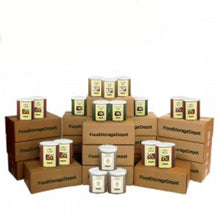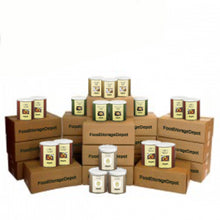Food Storage Depot
Ready Harvest 6-Month Food Storage Plan
Ready Harvest 6-Month Food Storage Plan
Couldn't load pickup availability
Ready Harvest 6-Month Food Storage Plan
The preparedness team at Food Storage Depot has calculated how much long-term storage food you will need for a 6-month food supply.
Our high-quality, freeze dried and dehydrated food and grains, supplies balanced nutrition, is aligned with the USDA My Plate Dietary Guidelines, and provides a daily average of about 2300 calories.
We suggest that you also purchase your own 3 gallons of oil (we recommend unrefined virgin coconut oil, as it stores longer than liquid oils) and 30 lbs. of sweeteners, such as sugar and honey.
With the addition of oil and sweeteners, this supply will provide you with approximately 3000 calories daily, which is enough for an adult active male, 14 years old and up.
FRUITS
- 6 #10 cans Ready Harvest Dehydrated Apple Chips
- 6 #10 cans Ready Harvest Freeze-dried Banana Slices
- 3 #10 cans Ready Harvest Freeze-dried Whole Blueberries
- 3 #10 cans Ready Harvest Freeze-dried Pineapple Chunks
- 3 #10 cans Ready Harvest Freeze-dried Peach Dices
- 3 #10 cans Ready Harvest Freeze-dried Strawberry Slices
VEGETABLES
- 3 #10 cans Ready Harvest Freeze-dried Broccoli
- 2 #10 cans Dehydrated Carrot Dices
- 1 #10 cans Ready Harvest Freeze-dried Cauliflower
- 1 #10 can Ready Harvest Freeze-dried Celery
- 3 #10 cans Ready Harvest Freeze-dried Sweet Corn
- 1 #10 can Ready Harvest Freeze-dried Garlic
- 3 #10 cans Ready Harvest Freeze-dried Green Beans
- 1 #10 can Ready Harvest Freeze-dried Mushroom Slices
- 3 #10 cans Ready Harvest Freeze-dried Onion
- 3 #10 cans Ready Harvest Freeze-dried Garden Peas
- 1 #10 can Ready Harvest Freeze-dried Green Bell Peppers
- 1 #10 can Ready Harvest Freeze-dried Spinach
- 1 #10 can Ready Harvest Freeze-dried Zucchini
POTATOES
- 3 #10 cans Ready Harvest Dehydrated Potato Dices
- 3 #10 cans Ready Harvest Dehydrated Potato Flakes
- 3 #10 cans Ready Harvest Dehydrated Potato Shreds
- 3 #10 cans Ready Harvest Dehydrated Sweet Potato Dices
BEANS
- 3 #10 cans Ready Harvest Quick-Cook Black Beans
- 3 #10 cans Ready Harvest Quick-Cook Pinto Beans
- 3 #10 cans Ready Harvest Quick-Cook Red Beans
GRAINS
- 6 #10 cans Ready Harvest Quick Oats
- 3 #10 cans Ready Harvest Quick-Cook Belgian Elbow Pasta
- 9 #10 cans Ready Harvest Nutrient-Rich Parboiled Rice
- 1 5-gallon bucket Ready Harvest Certified Organic, Non-GMO, Hard Red Wheat
- 1 5-gallon bucket Ready Harvest Certified Organic, Non-GMO, Hard White Wheat
PROTEIN
- 3 #10 cans Ova Easy Egg Crystals
- 12 #10 cans Ready Harvest Dried Instant Nonfat Milk
- 1 #10 can Mountain House Freeze-dried Diced Chicken
- 1 #10 can Mountain House Freeze-dried Diced Beef
- 1 #10 can Mountain House Freeze-dried Ground Beef
SALT - 2 - 26oz Real Salt Pouches
GLUTEN-FREE OPTION - not certified : Different $$ and will put
Omit the two 5 gallon buckets of wheat and 2 #10 cans Ready Harvest Quick-Cook Belgian Elbow Pasta. Add:
- 6 #10 cans Ready Harvest Nutrient-Rich Parboiled Rice (total 12 cans)
- 9 #10 cans Ready Harvest Quick Oats (total 12 cans)
- 5 #10 can Ready Harvest Premium Non-GMO Popping Corn (total 6 cans)
Pallet shipping is available. Call us at 801-583-2215 M-F 10am to 6pm (MST) or SAT 10am to 3pm (MST), except holidays (or email us at contactus@foodstoragedepot.com anytime).
Taste and See the Difference:
This 6-month package consists of freeze-dried foods, dehydrated foods and grains. Having 6 months of food on hand for each person in your household ensures that if there were an emergency that lasted several weeks and grocery stores were not open, you and your family would make it through easier, without the added stress of wondering what you would eat.
Food Storage Depot makes sure all our food plans contain about 2300 calories per day so you will have enough energy to withstand any crisis.
Five Crucial Lessons to Understand BEFORE Purchasing Long-Term Food Storage
In order to save yourself both money and time as well as future heartache, take a moment to educate yourself with 5 crucial lessons for long-term food plans:
1. Packaging
Most companies package freeze-dried and dehydrated food in silver-colored #10 metal cans. Unfortunately, after just a few years, many foods interact with the metal, giving the food a metallic taste. To prevent this problem, Food Storage Depot packages the Ready Harvest freeze-dried and dehydrated foods in food-grade enamel lined #10 cans, which protect the food from this interaction, resulting in good tasting foods for their entire 25-30 years of shelf-life. Mountain House also uses the enamel lined #10 cans.
Check the volume of food in the #10 cans you purchase, as many companies do not fill up their cans, so you may be storing air in your valuable cold storage space, instead of all the food possible. The Ready Harvest #10 cans are full with 12 cups of high quality, Non-GMO, freeze-dried or dehydrated food.
2. Shelf Life
In the food industry, we talk about the 4 food killers. These food killers are: light, moisture, oxygen, and heat. Food Storage Depot eliminates the first three with our high-quality, dry Ready Harvest products in enamel lined cans, packed with oxygen absorbers. The 4th killer, heat, is up to you – to store your food in a cooler location at 70F or less. Yet, there are other factors that most people never talk about when it comes to shelf life. For example, foods that contain oils (such as nutty granolas and whey milk) will go rancid quickly and will not last the "up to 25 years" many are claiming.
The same goes for powdered foods (such as pancake mixes, cream of wheat, and canned/pouched meals that require cooking to eat). Any time you break down a whole grain into a powdered form, you diminish the shelf life tremendously.
Also, the recent fad, called Nitrogen or CO2 flushing, doesn’t work. Unless your packages contain oxygen absorber packets inside, the food will spoil quickly. Nitrogen and CO2 “flushes,” though inexpensive and profitable for the manufacturers, are a risky road to take for the consumer. And by the way, both Mountain House and Food Storage Depot always use oxygen absorber packets with all our foods, except our certified organic, non-GMO, HEIRLOOM wheat, which needs oxygen in order to be able to sprout.
3. Freeze-Dried vs Dehydrated Foods
Freeze drying is a process that allows foods to last longer and retain more nutrients than any other method, but because of the complex process (using vacuum chambers and sublimation), it usually costs a premium. Freeze-dried foods can retain up to 90-99% of their nutrients and can last 25-30 years on a shelf if packaged in oxygen-free cans.
Dehydration, on the other hand is done through low-level-heating for long periods of time and may lose up to 40% of their nutrients, yet they preserve very well. Dehydrated foods are more common than people realize (i.e., beans, spaghetti, macaroni, rice, pancake mixes, oats, jerky, etc.). Neither freeze-dried nor dehydrated foods require refrigeration when stored, which makes them perfect for emergency food storage.
Both freeze-dried and dehydrated foods are important for a long-term food storage. A 1-month supply should include more pre-made, pre-cooked options (such as freeze-dried foods, quick-cook rice or pre-cooked beans, etc.), in case there are utility outages. 6-12 month packages should include more dehydrated staples (i.e., rice, beans, oats, etc.), because of the dense concentrations of food in each can and also because opened cans of dehydrated food will last 6-24 months on a shelf. In comparison, opened cans of freeze-dried foods should be stored as air-tight as possible and eaten within a few weeks.
4. Servings vs Calories and Nutrition
When you see companies in the market pushing servings rather than calories and nutrition, a red flag should raise in your mind. A “serving” of food, for example, may be only 1/4 cup and only contain 100 calories, so “servings” alone is a poor indication of the value of your food plan. Here are a few things to understand:
Most people require between 1500-3000 calories a day to sustain their health, and those calories should come from a variety of foods in order to get the proper nutrients your body needs. (Here is a calculator you can use to see how many calories you and your family require daily: http://www.caloriesperhour.com/index_burn.php .) So, make sure you are getting enough calories and diversity in your foods.
Having enough calories is an essential part of any food storage plan, yet you also need the right nutrients. Watch out for packages with a small selection of foods or food types, and watch out for “calorie stuffing.”
Calorie stuffing is a sneaky common practice in our industry where vendors add items such as oily granolas or large amounts of sugar drinks in food plans, in order to “up” the calories. Sometimes you will even see 6-12 cans of sugar drinks in a 3-month package. Though certain nut-less granolas and certain vitamin-fortified, fruit-flavored drinks can be good for your supply, large amounts of either is an indication of “calorie stuffing.”
As you consider proper nutrients, you need to become aware of sodium levels (salt). For long-term food plans, you should always keep your daily average of sodium under 2400 mg a day. High levels of sodium can cause blocked bowels, hypertension, impaired thinking, and the need to drink more of your precious emergency water in order to neutralize the sodium. And, if you are over 53 years old, it could become lethal.
5. Top Quality
When you consider the investment you're making into emergency food, you want to make sure you are buying healthy, clean food that will last for decades if needed. Some companies will skimp on that quality to increase their profits, which is never good business. That’s why you see substitutions such as pouches rather than cans, nitrogen or CO2 flushes rather than oxygen absorber packets in each container, whey milk rather than real 100% non-fat milk (which has much higher nutrients and lasts longer), and high amounts of soups in place of denser meals.
Conclusion: Food Storage Depot goes out of the way to make sure we are providing value to our customers. The bottom line is: if you are going to spend money on food storage, take the time to understand what you’re buying. The five guidelines above will help you purchase the right way. Why take a chance on food you may be eating up to 30 years from now?
Want to prepare your family the right way, the first time with exceptional emergency preparedness? Visit www.Thrivalist.com today!
Note: Bulk pricing for groups, institutions, or corporations is available. Call us at 801-583-2215 M-F 10am to 6pm (MST) or SAT 10am to 3pm (MST), except holidays (or email us at contactus@foodstoragedepot.com anytime).
Share This Product

Subscribe to our emails
Be the first to know about new collections and exclusive offers.

